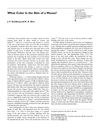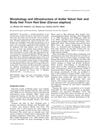 11 citations,
August 2018 in “Asian-Australasian journal of animal sciences”
11 citations,
August 2018 in “Asian-Australasian journal of animal sciences” Short daily photoperiods improve cashmere production in Inner Mongolia white cashmere goats.
 4 citations,
November 2009 in “Medical Clinics of North America”
4 citations,
November 2009 in “Medical Clinics of North America” Stress, nutritional issues, and chronic diseases can cause hair loss, and nail changes may signal internal diseases; treatment focuses on the underlying cause.
 169 citations,
August 2004 in “Baillière's best practice & research. Clinical obstetrics & gynaecology/Baillière's best practice and research in clinical obstetrics and gynaecology”
169 citations,
August 2004 in “Baillière's best practice & research. Clinical obstetrics & gynaecology/Baillière's best practice and research in clinical obstetrics and gynaecology” Lower doses of treatments for hirsutism and acne in PCOS are effective and cause fewer side effects.
 73 citations,
February 2007 in “The American Journal of Medicine”
73 citations,
February 2007 in “The American Journal of Medicine” PCOS is a common hormonal disorder in women, treated with lifestyle changes and medications like hormonal contraceptives and metformin.
 23 citations,
November 2001 in “Archives of Dermatology”
23 citations,
November 2001 in “Archives of Dermatology” Genetic discoveries are key for understanding, diagnosing, and treating inherited hair and nail disorders.
 3 citations,
January 2012 in “Wageningen Academic Publishers eBooks”
3 citations,
January 2012 in “Wageningen Academic Publishers eBooks” Hair health depends on various factors and hair loss can significantly affect a person's well-being; understanding hair biology is key for creating effective hair care treatments.
 1 citations,
January 2019 in “Paediatrics and Child Health”
1 citations,
January 2019 in “Paediatrics and Child Health” The document concludes that understanding hair biology and recognizing hair conditions are crucial for managing and treating hair loss in children.
 January 2017 in “Springer eBooks”
January 2017 in “Springer eBooks” The document explains various skin conditions and their treatments.
 December 2015 in “Kosin Medical Journal”
December 2015 in “Kosin Medical Journal” PCOS treatment should address both symptoms and metabolic risks, starting with lifestyle changes and possibly including medication.
 288 citations,
June 2009 in “Human reproduction update”
288 citations,
June 2009 in “Human reproduction update” The modified Ferriman-Gallwey method is a useful tool for diagnosing hirsutism.
 86 citations,
August 2014 in “Journal of The American Academy of Dermatology”
86 citations,
August 2014 in “Journal of The American Academy of Dermatology” To diagnose hair loss, use a systematic approach including history, exams, and tests.
 41 citations,
December 2015 in “Journal of the European Academy of Dermatology and Venereology”
41 citations,
December 2015 in “Journal of the European Academy of Dermatology and Venereology” The conclusion is that a new biopsy technique and humidity chamber help study skin mites better and suggest mite overpopulation may cause skin diseases.
 41 citations,
September 2011 in “Journal of Ethnopharmacology”
41 citations,
September 2011 in “Journal of Ethnopharmacology” Panax ginseng extract helps mice grow hair.
 39 citations,
December 2013 in “Phytotherapy Research”
39 citations,
December 2013 in “Phytotherapy Research” Safflower (Carthamus tinctorius) extract helps hair grow and could be used in hair products.
 29 citations,
May 1998 in “Bulletin of the American College of Nurse-Midwifery”
29 citations,
May 1998 in “Bulletin of the American College of Nurse-Midwifery” The document concludes that menopause should be seen as a natural part of aging and managed with personalized care and informed choices.
 23 citations,
January 2016 in “Theranostics”
23 citations,
January 2016 in “Theranostics” Minoxidil-coated microbubbles with sonication effectively enhance hair growth.
 21 citations,
November 2011 in “Veterinary Pathology”
21 citations,
November 2011 in “Veterinary Pathology” Mouse skin color ranges from pink to black, depending on their hair growth cycle.
 18 citations,
November 2010 in “Journal of morphology”
18 citations,
November 2010 in “Journal of morphology” Antler velvet hair and body hair of red deer have different structures that help with protection and insulation.
 17 citations,
October 2015 in “Medicine and Pharmacy Reports”
17 citations,
October 2015 in “Medicine and Pharmacy Reports” Animal models are crucial for learning about hair loss and finding treatments.
 13 citations,
December 2017 in “BMC Complementary and Alternative Medicine”
13 citations,
December 2017 in “BMC Complementary and Alternative Medicine” The Asian herbal mix with Houttuynia cordata, Perilla frutescens, and green tea helped grow hair in mice.
 13 citations,
January 2015 in “Evidence-based Complementary and Alternative Medicine”
13 citations,
January 2015 in “Evidence-based Complementary and Alternative Medicine” Garlic chive extract helped mice grow more hair by increasing a specific growth factor.
 10 citations,
May 2018 in “Forensic Science International”
10 citations,
May 2018 in “Forensic Science International” Shrunken heads retain some facial features and hair characteristics, allowing for limited individual identification.
 8 citations,
November 2022 in “International Journal of Cosmetic Science”
8 citations,
November 2022 in “International Journal of Cosmetic Science” Human hair varies widely and should be classified by curl type rather than race.
 8 citations,
May 2017 in “Chinese Journal of Integrative Medicine”
8 citations,
May 2017 in “Chinese Journal of Integrative Medicine” Miscanthus sinensis flower extract may help promote hair growth and prevent hair loss.
 6 citations,
July 2013 in “Experimental and Therapeutic Medicine”
6 citations,
July 2013 in “Experimental and Therapeutic Medicine” Ginsenoside Rg1 protects mouse skin from UVB damage and helps control inflammation.
 3 citations,
July 2017 in “Elsevier eBooks”
3 citations,
July 2017 in “Elsevier eBooks” Skin reactions are a common reason for emergency visits due to drug allergies, with some severe cases needing intensive care.
 2 citations,
July 2018 in “Elsevier eBooks”
2 citations,
July 2018 in “Elsevier eBooks” Trichoscopy is a useful tool for diagnosing and managing hair and scalp conditions, often better than traditional methods.
 2 citations,
December 2014 in “Research & Reviews: Journal of Pharmacy and Pharmaceutical Sciences”
2 citations,
December 2014 in “Research & Reviews: Journal of Pharmacy and Pharmaceutical Sciences” Carrot extract in gel form may help hair grow better.
 1 citations,
January 2024 in “Nature communications”
1 citations,
January 2024 in “Nature communications” Activating TLR5 in the gut can extend lifespan and improve health in aged mice.
 July 2024 in “Frontiers in Pharmacology”
July 2024 in “Frontiers in Pharmacology” Pilose antler extracts help hair growth by activating hair follicle stem cells.






























